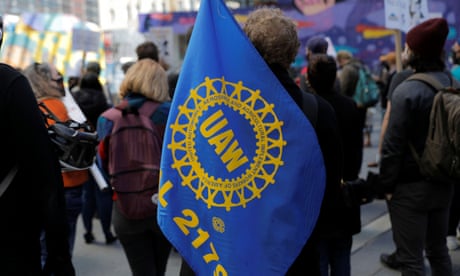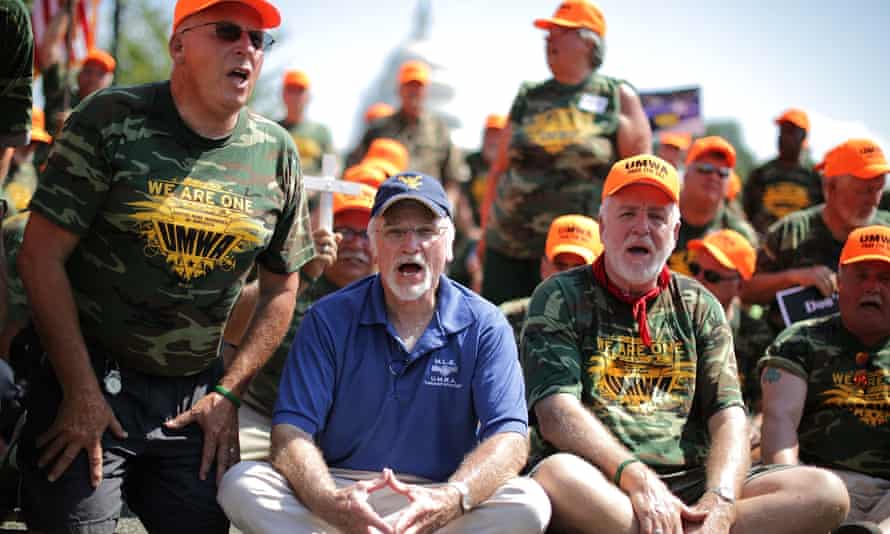
As the strike heads into its third month, workers are fighting for improvements to wages and benefits after they say several concessions were made by workers under the previous contract in 2016 when Warrior Met Coal took control of the mines in the wake of a bankruptcy filing by Walter Energy.

The strike has energized support across the state and other parts of the south, in an area that has traditionally been hostile to labor disputes.
Last month supporters held a concert to raise money for striking miners that included Mike Cooley of the Drive-By Truckers and comedian Drew Morgan. Labor leaders from around the US, including the AFA-CWA president, Sara Nelson, and the AFL-CIO secretary treasurer, Liz Shuler, have visited the striking miners to lend their support.
“Warrior Met still refuses to engage in meaningful negotiations with the UMWA at the bargaining table,” the UMWA international president, Cecil E Roberts, said in a recent press release. “But they are clearly on the wrong side of history. Community support for the strikers is growing, and now their struggle is gaining nationwide attention.”Strikers say they are suffering the impacts from the lost income, which makes it difficult to make ends meet and afford basic necessities like food and rent or home payments. They have also carried out acts of civil disobedience outside the company’s main offices.
James Traweek has worked at Warrior Met Coal for four years at the No 7 mine in Brookwood. He explained miners accepted a $6-an-hour pay cut and reduction in health insurance and retirement benefits during the bankruptcy process five years ago, while adhering to a strict attendance policy.
“We were required to work six, sometimes seven days a week, for 12 hours a day. We worked on a four-strike system, which meant missing four days in a year resulted in termination,” said Traweek. “The only thing that was accepted as an excuse was a death in the immediate family. We had to work sick with the flu and many other illnesses in fear of losing our jobs.”
He noted the workers were just seeking to be compensated what they were worth in wages and benefits comparable to other unionized mines. Warrior Met Coal have brought in replacement workers as part of their continuity plan, the use of which Traweek characterized as “gut-wrenching”.
“We’re fighting for our families and every other member of the organized labor community across the world. We can’t allow corporate greed to rob us of our dignity and worth,” added Traweek. “After bringing a company from bankruptcy to record breaking production, we feel we deserve more.”

Ahead of the strike, the UMWA filed several unfair labor practice charges against Warrior Met Coal, including allegations the company threatened bankruptcy and layoffs. Shortly after the strike began, Warrior Met Coal obtained a court injunction limiting the number of striking workers on the picket lines on site at the mines and local residents reported complaints of visible pollution in two creeks from runoff at the mine sites a few weeks into the strike.
The company recently assured investors in an earnings call that customer production volume commitments would be met through 2021, despite the strike’s impact on production at mines in Alabama.
“The mining industry is an important part of the community in Brookwood, Alabama. This has been the way of life here for a long time. The wealthy conglomeration in New York that took over the bankrupt Walter Energy does not care about the men and women that work in the coalmines or their families,” said Rily Hughett, a coalminer at Warrior Met Coal in Brookwood for 13 years, who worked through the bankruptcy transition in 2016.
Hughett explained coalminers face multiple dangers working on the job, including the risk of roof falls, methane gas buildups, low oxygen levels, working with heavy equipment and the pressure on workers to cut corners on safety for the sake of production. Coalmining is historically one of the most dangerous job professions.
Though Warrior Met Coal experienced a drop in revenue during the coronavirus pandemic as the coal and steel industries slowed down production, the company has made millions of dollars in profits since the bankruptcy. They reported a loss of about $35m in 2020 compared with net income of $302m in 2019.
“We only want a fair wage and good insurance for our families, but while they make hundreds of millions of dollars, they should show a little respect for the men and women that brought this company from bankruptcy to a thriving company,” Hughett added.
Workers rejected a tentative agreement offered by the company on 9 April, opting to continue the strike, as they were offered just a $1.50-an-hour raise over five years.
“They lowballed it,” said Marcus Vance, another coalminer on strike at Warrior Met Coal. “I think they’re trying to starve everybody out.”
Warrior Met Coal did not respond to multiple requests for comment.


